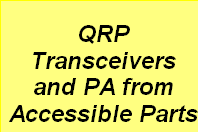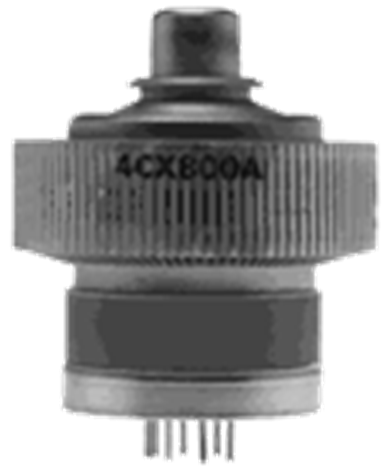

Antentop is FREE e-magazine devoted to Antennas and Amateur Radio an
Special page devoted to
Interferences from Old Power Amplifiers

Custom Search
|
ANTENTOP-
02- 2003, # 003 |
Interferences from Old Power Amplifiers |
|
|
|
|
|
|
|
|
|
|
|
By
Igor Grigorov, RK3ZK |
|
|
|
|
One
of the possible causes of interferences to reception of the radio
and television from Power Amplifiers (PA) is degradation of an
output tube or an output transistor of the Power Amplifier (PA). Let's
put the basic signs directing this cause. At first, there are
stable heavy interferences to radio equipment when the PA (or
transceiver, in which one the PA is) works even on low - frequency
amateur ranges 160- and 80 meters, where, as usual, such interferences
are absent. At second, it is very possible that the PA is excited at some
restricted segments of amateur ranges, or at an amateur range,
or when this one is operated at a definite mode- CW, SSB or RTTY.
For example, a PA is excited by operation on SSB, but ensures
stable running on CW. One more version, a PA is excited when it
works in the beginning of an amateur range, but this one works
good in the middle or in the upper end of this range. At third, usually the invalid PAs consume a large d.c. current
but give a small RF power. When the Pas consume a large d.c. current
they, as usual, give a large level of interferences. When the
Pas work at a small consumed d.c. current, they do not give interferences
at all! To improve this situation can only changing
the degraded tube or transistor for a new one. Or, to reduce output
power helps to remove the interferences. Tubes... It
is quite possible to detect the degraded tube with metal anode
in visually way. An anode of a new tube has evenly color, usually
grey. An anode of a degraded tube has unnaturally color often
the anode has an undulating spots. Joints of the degraded anode
quite often have distortions. Pins
of some output tubes after a long-period operation are covered
with oxides, especially if a power amplifier was maintained in
a wet location, ever on open air, or in a location, where aggressive
gases are in air. Sometimes, a non- hermetic lead-acid or alkaline
accumulator placed near a PA causes to cover the pins by a layer
of oxides. The cleaning of pins of tube socket often gives only
short-term effect. Only soldering the oxidation pins of tube to
pins of tube socket improves the situation. |
Transistor. Power
transistors do more harm then tubes. All modern RF bipolar transistors
have a structure consisting of many independent emitters. When
only one emitter is degraded the whole transistor is degraded,
too. The degraded emitter can produce harmonicses of the base
signal that causes RFI and TVI. The
degradation is quite possible at a current overload or just long-lived
operation of a transistorized PA. The overload can be as on the
input signal - overflow of a base current, so on the output signal
- overflow of a collector current. Even a short-term overload
can damage a power transistor. Very often when the degraded transistor
is checked at d.c., it behaves as operable. Only changing of a
degraded transistor for a good one allows to
find the true source of the interferences. Cold soldering. Cold
soldering represents especially unpleasant phenomenon for both,
as transistor as tube PA. It can reduce to appearance of heavy
radio interferences. All suspicious soldered places are knocked
by wooden or plastic stick and monitoring at thus for interferences.
After that the fond cool soldering is thoroughly soldered. Remember,
a long term service of any PA is possible only when
all modes of operation of output transistor or output tube
are at right conditions.
|
|
|
|
|
Page 33 |
|
33
 |
 |
 |
 |
Just for Fun:

Powered byIP2Location.com
Thanks for your time!
Last Updated:
March 8, 2020 21:09





